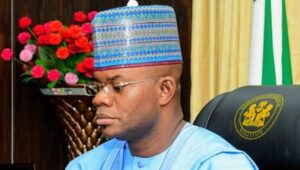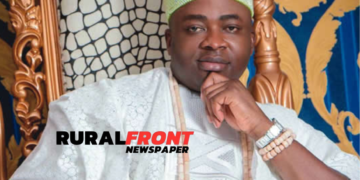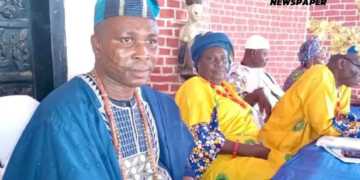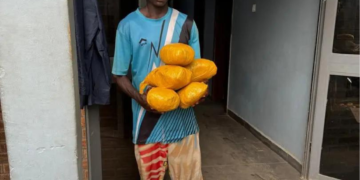The immediate past Governor of Kogi State, Alhaji Yahaya Bello, who is facing a 19-count charge, has written a letter to the Chief Judge of the Federal High Court, Justice John Tsoho, pleading to be allowed to face his trial in Kogi.
Ex-governor Bello, in the letter he wrote through his team of lawyers led by Mr. Abdulwahab Mohammed, SAN, maintained that only Lokoja Division of the high court has the territorial jurisdiction to entertain the allegations that were raised against him by the Economic and Financial Crimes Commission, EFCC.
At the resumed proceeding in the matter on Thursday, Bello, failed to appear before the Federal High Court in Abuja to enter his plea to the charge against him.
However, a lawyer that announced appearance for him, Mr. Adeola Adedipe, SAN, brought the attention of trial Justice Emeka Nwite to the letter his client wrote to the CJ.
Addressing the court after the matter was called, Adedipe, SAN, said, “My lord, after the proceedings of the last adjourned date, I went back and gave a report of what happened in court to our team.
However, I was made to understand that a letter had been written on behalf of the defendant to the honourable Chief Judge of the Federal High Court requesting in substance, that this matter be administratively transferred to the Federal High Court, Lokoja Judicial Division, which we believe have territorial jurisdiction to handle this matter.
That letter was received at the Chief Judge’s Chambers and the office of the of honourable CJ wrote the prosecution team through Mr. Iseoluwa Rotimi Oyedepo, SAN, on June 13, notifying him that administrative steps has been activated, whereof he was directed to provide a response to the request for transfer of the matter.
My lord, as of this morning, I am not aware whether there has been a response by the prosecution team in compliance to the directive of the CJ.
We are also not in receipt of any decision that has been made on this request by the CJ.
I am also aware that this administrative directive of the CJ has been formally communicated to this court.
We have filed an affidavit wherein we attached two documents referencing the details that I have just highlighted.
My duty is first to the court. As of the moment, I am not urging anything from the court, but just to present the facts as they were,” Adedipe, SAN, added.
On his part, the EFCC, through its counsel, Mr. Kemi Pinhero, SAN, urged the court to compel the defence lawyer to explain why the defendant was not in court, despite an undertaking he made on June 13 to ensure his presence in court for arraignment.
He prayed the court to dismiss “the story of the defence lawyer as dilatory and a further attempt to treat this court with scorn.”
The EFCC counsel argued that the letter to the CJ did not discharge the undertaking that were made by the senior lawyers representing the defendant.
Pinhero, SAN, further argued that even where a petition is forwarded against a judge to the National Judicial Council, NJC, it does not stop proceedings on cases pending before the judge.
Consequently, he applied for the court to invite the two senior lawyers representing the former governor to show cause why they should not be dealt with for contemptuous conduct.
Bello, who piloted affairs of Kogi state for eight years, is facing a charge bordering on his alleged complicity in money laundering, breach of trust and misappropriation of public funds to the tune of about N80.2billion.
EFCC alleged that the former governor, alongside his nephew Ali Bello and two others, Dauda Suleiman and Abdulsalam Hudu, were complicit in money laundering.
Though the ex-Kogi governor previously failed to appear before the court for his arraignment, however, he briefed lawyers to file an application to set aside an arrest warrant that was issued against him on April 17, as well as to challenge the jurisdiction of the court to try him.
The former governor maintained that the EFCC acted in breach of a subsisting judgement of a High Court in Kogi State when it entered the charge against him and also applied for a bench warrant to be issued for his arrest.
Even though the court, in a ruling it delivered on May 10, declined to vacate the arrest warrant, it, however, gave the defendant the opportunity to voluntarily present himself for arraignment.
The case has drawn significant attention due to the high-profile nature of the accused and the substantial amount of money involved. The allegations against Bello are serious, and the EFCC is determined to see the case through to its conclusion. The legal team representing Bello is equally committed to defending their client and ensuring that the trial is conducted in a fair and just manner.

The letter to the Chief Judge is a strategic move by Bello’s legal team. By requesting that the trial be moved to Lokoja, they are hoping to leverage the territorial jurisdiction argument to their advantage. This move could potentially delay the proceedings, giving them more time to prepare their defense. However, the EFCC is pushing back, arguing that the trial should proceed as scheduled in Abuja.
The court’s decision on this matter will be crucial. If the trial is moved to Lokoja, it could set a precedent for other high-profile cases. On the other hand, if the court decides to keep the trial in Abuja, it will send a strong message about the judiciary’s commitment to ensuring that justice is served, regardless of the location.
The next few weeks will be critical for both sides. The EFCC will need to present a strong case to counter the arguments made by Bello’s legal team. They will need to demonstrate that the trial should proceed in Abuja and that the charges against Bello are valid. Bello’s legal team, on the other hand, will need to continue to build their case and prepare for the possibility of a trial in Abuja.
The outcome of this case will have significant implications for Bello and his political career. If he is found guilty, it could end his political ambitions and tarnish his legacy. However, if he is acquitted, it could bolster his standing and potentially pave the way for a return to politics.
The public is closely watching this case, and there is a great deal of interest in the proceedings. The media is covering the trial extensively, and there is a lot of speculation about the potential outcomes. The case has also sparked a broader conversation about corruption and accountability in Nigeria. Many are hoping that this trial will serve as a wake-up call and lead to greater efforts to combat corruption in the country.
As the trial progresses, it will be important for all parties involved to ensure that the proceedings are conducted in a fair and transparent manner. The judiciary has a critical role to play in upholding the rule of law and ensuring that justice is served. The outcome of this case will be a test of the judiciary’s ability to handle high-profile cases and deliver justice.
In conclusion, the trial of Alhaji Yahaya Bello is a significant event that has captured the attention of the public and the media. The allegations against him are serious, and the outcome of the trial will have far-reaching implications. Both the EFCC and Bello’s legal team are preparing for a tough legal battle, and the next few weeks will be crucial in determining the direction of the case. The judiciary’s handling of this case will be closely watched, and it will be important for the proceedings to be conducted in a fair and transparent manner. The public is hoping for a just outcome that will serve as a step towards greater accountability and transparency in Nigeria.
























